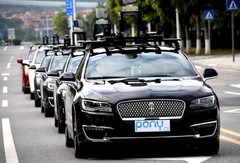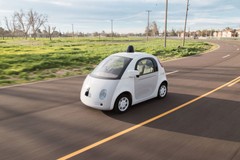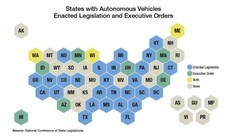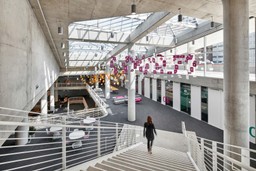
CRE Technology
Everything You Need to Know About Driverless Cars and Real Estate
Driverless cars are quickly becoming a reality and even though it’s still years before they dominate the roads, the profound impact it is poised to have on the real estate market should be considered.
The rapid innovation and technology development of autonomous vehicles is forcing real estate owners, operators, investors and other professionals to consider how their properties need to adapt to this new reality.
We’ve selected a list of 10 articles on how driverless cars will impact real estate to help you better understand its industry-shifting implications.
How Driverless Cars Could Disrupt The Real Estate Industry
Driverless cars could become a regular feature of the roads as early as April – at least in California, which has decided to allow fully autonomous vehicles to be tested on the roads (none of those pesky humans who have been present in test drives so far). Arizona has already become a fair-weather center for testing driverless vehicles, thanks in large part to the governor’s support, and Uber announced last week that it has finished testing its self-driving trucks in Arizona and is now beginning to use them to move goods across the state.
Read the full article by Ely Razin on Forbes
How Self-driving Cars Could Completely Reshape the Housing Market
Prime real estate will be unlocked for new home construction as parking lots, auto dealerships and gas stations become obsolete. Additional supply in historically supply constrained locations will likely dampen home price appreciation and alleviate housing shortages in many cities. Due to increased housing supply in good locations, there will initially be less demand for outlying locations, even though commutes will be easier.
Read the full article by Wolf Richter
My Thoughts On The Massive Impact Autonomous Cars Will Have On Real Estate
Autonomous cars will be pervasive in the next 5-10 years. They will be safer and more efficient than human drivers and they’ll all be electronic.
There’s no doubt autonomous cars are coming soon and the impact on the real estate industry will be massive. However, very few in the real estate industry is talking about it and even less are preparing for the impact it could have on their business.
Read the full post by Joe Stampone
Driverless Cars Will Open the Door to a Building Spree
It’s far from clear how long it will be before fully autonomous vehicles are ready to rule the road, or how governments will choose to regulate them. The 25 biggest U.S. cities generated a combined $5 billion last year from parking tickets, vehicle registrations, and other related revenue, according to data compiled by Governing magazine. Governments will also have to grapple with the likelihood that as the cost of the vehicles comes down, fleet companies may overburden roads with them.
Read the full article by Patrick Clark on Bloomberg
How Autonomous Vehicles Will Steer Toward A Building Boom
Urban development is not the only thing expected to experience a major change as self-driving cars become more commonplace. Suburbs are also likely to see an infusion of development as people become more willing to live farther away from their workplace because they no longer have to drive themselves to and from the office, Bloomberg reports.
Read the full article by Lara O’Keefe on Bisnow
A Driverless Future Threatens the Laws of Real Estate
The link between property and transport has been perhaps the most durable in human history.
Since the ancients, few things have delivered higher land values with more certainty than advances in transport, from roads to canals, railways to highways.
It’s still “a no-brainer” in the 21st century, says Bridget Buxton. She bought a fixer-upper with her husband in a scruffy part of east London in 2016 because it’s a short walk to the high-speed crosstown rail line due to open this year. Prices are up 90 percent in the past five years for homes like hers, far outpacing the whole city.
Read the full article by Jack Sidders and Jess Shankleman on Bloomberg
The Sad Truth About Self-Driving Cars? Give Them at Least 10 More Years
A recent crash that killed a pedestrian, setbacks with Tesla and others, delays in building out the infrastructure–it’s hard to stay positive when you’ve been waiting more than a decade, and when you do believe that there is some possibility that cars will drive on their own without any mishaps. Way back in 2007, the experts envisioned a future scenario that involved daily autonomous driving, as though it was second-nature. In that same article, the idea of building highways for autonomous cars still seemed like a distant dream.
Read the full article by John Brandon on Inc
The Future, Now – Autonomous Vehicles Will Force the Adaptation of Commercial Real Estate
July 2018
The rapid evolution of autonomous vehicle technology has forced real estate investors and developers to consider how their investments, both new and old, may need to adapt. Long an awe-inspiring element of science fiction, driverless cars soon will become more than just Hollywood’s picture of the future – they will be picking us up, dropping us off, and parked in our garages.
Read the full article by Ben Hittman on CCIM
The Game-changer For Future Cities: Driverless Cars
Most experts agree that the automobile as we know it will be largely obsolete by 2030. In its place will be fleets of driverless cars that shuttle people safely and efficiently through our city streets. But it’s the broader impacts of this technology that are a game-changer for the future of our cities and the human experience. The opportunity is not only to create new places that accommodate driverless cars, but to reshape our existing cities and towns into the kind of amenity-rich, vibrant places that we all enjoy.
Read the full post by Andy Cohen
Driving Into The Future: Self-driving Cars And CRE
Ten years ago, what would you think if someone told you that in the year 2020, people would be chauffeured around the city by self-driving cars? It would probably sound like something that came straight out of a movie, and you’d probably be worried about machines becoming sentient and forming an uprising against mankind. The good news is that we’re safe from a real-life Terminator scenario for now and that automobiles are going to be driving themselves in the not-so-distant future.
Related Blog Posts
Marketing Best Practices
Marketing Toolkit for Real Estate Investment Sales
As an investment sales team in commercial real estate, having the right tools at your...
Company updates
Avison Young Selects SharpLaunch as Exclusive CRE Marketing Solution Across U.S. and Canada
SharpLaunch delivers a unified global marketing experience and seamless integration,...
CRE Technology
How to Integrate SharpLaunch with Salesforce
While Salesforce is a powerful CRM, it’s not specifically designed for the unique needs...












